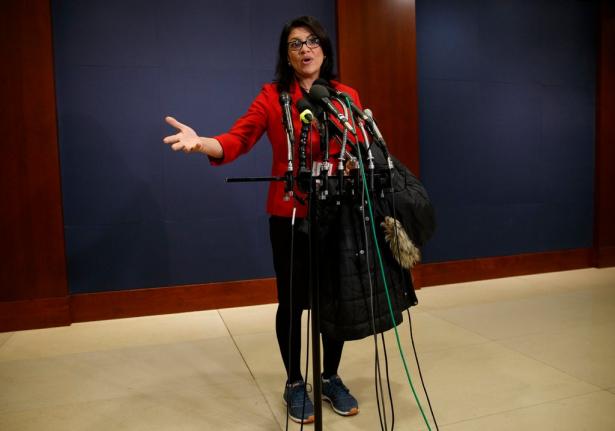On Monday, in an interview with The Intercept, Rashida Tlaib, a Michigan Democrat who in November became the first Palestinian-American elected to Congress, went public with her support for the Boycott, Divestment and Sanctions movement, which seeks to use economic pressure on Israel to secure Palestinian rights. That made her the second incoming member of Congress to publicly back B.D.S., after Minnesota Democrat Ilhan Omar, who revealed her support last month.
No current member of Congress supports B.D.S., a movement that is deeply taboo in American politics for several reasons. Opponents argue that singling out Israel for economic punishment is unfair and discriminatory, since the country is far from the world’s worst violator of human rights. Further, the movement calls for the right of Palestinian refugees and millions of their descendants to return to Israel, which could end Israel as a majority-Jewish state. (Many B.D.S. supporters champion a single, binational state for both peoples.) Naturally, conservatives in the United States — though not only conservatives — have denounced Tlaib and Omar’s stance as anti-Semitic.
It is not. The conflation of anti-Zionism with anti-Semitism is a bit of rhetorical sleight-of-hand that depends on treating Israel as the embodiment of the Jewish people everywhere. Certainly, some criticism of Israel is anti-Semitic, but it’s entirely possible to oppose Jewish ethno-nationalism without being a bigot. Indeed, it’s increasingly absurd to treat the Israeli state as a stand-in for Jews writ large, given the way the current Israeli government has aligned itself with far-right European movements that have anti-Semitic roots.
The interests of the State of Israel and of Jews in the diaspora may at times coincide, but they’ve never been identical. Right-wing anti-Semites have sometimes supported Zionism because they don’t want Jews in their own countries — a notable example is the Polish government in the 1930s.
Conversely, there’s a long history of Jewish anti-Zionism or non-Zionism, both secular and religious. In 1950 Jacob Blaustein, the president of the American Jewish Committee, one of the country’s most important Jewish organizations, reached an agreement with Israel’s prime minister, David Ben-Gurion, in which Ben-Gurion essentially promised not to claim to speak for American Jews. “Jews of the United States, as a community and as individuals, have no political attachment to Israel,” said Blaustein at the time.
Decades later, such a statement from the committee — or any major, mainstream Jewish organization — would be unthinkable. A consensus set in “that Jewish identity can be reduced to Israelism,” Eliyahu Stern, an associate professor of modern Jewish history at Yale, told me. “That’s something that takes place over the second half of the 20th century in America.”
The centrality of Israel to American Jewish identity has at times put liberal American Jews in an awkward position, defending multiethnic pluralism here, where they’re in the minority, while treating it as unspeakable in Israel, where Jews are the majority. (American white nationalists, some of whom liken their project to Zionism, love to poke at this contradiction.)
Until fairly recently, it was easy enough for many liberals to dismiss consistency on Israel as a hobgoblin of little minds. A binational state might sound nice in theory, but in practice is probably a recipe for civil war. (Even the Belgians have trouble managing it.) The two-state solution appeared to offer a route to both satisfying Palestinian national aspirations and preserving Israel’s Jewish, democratic character.


Spread the word